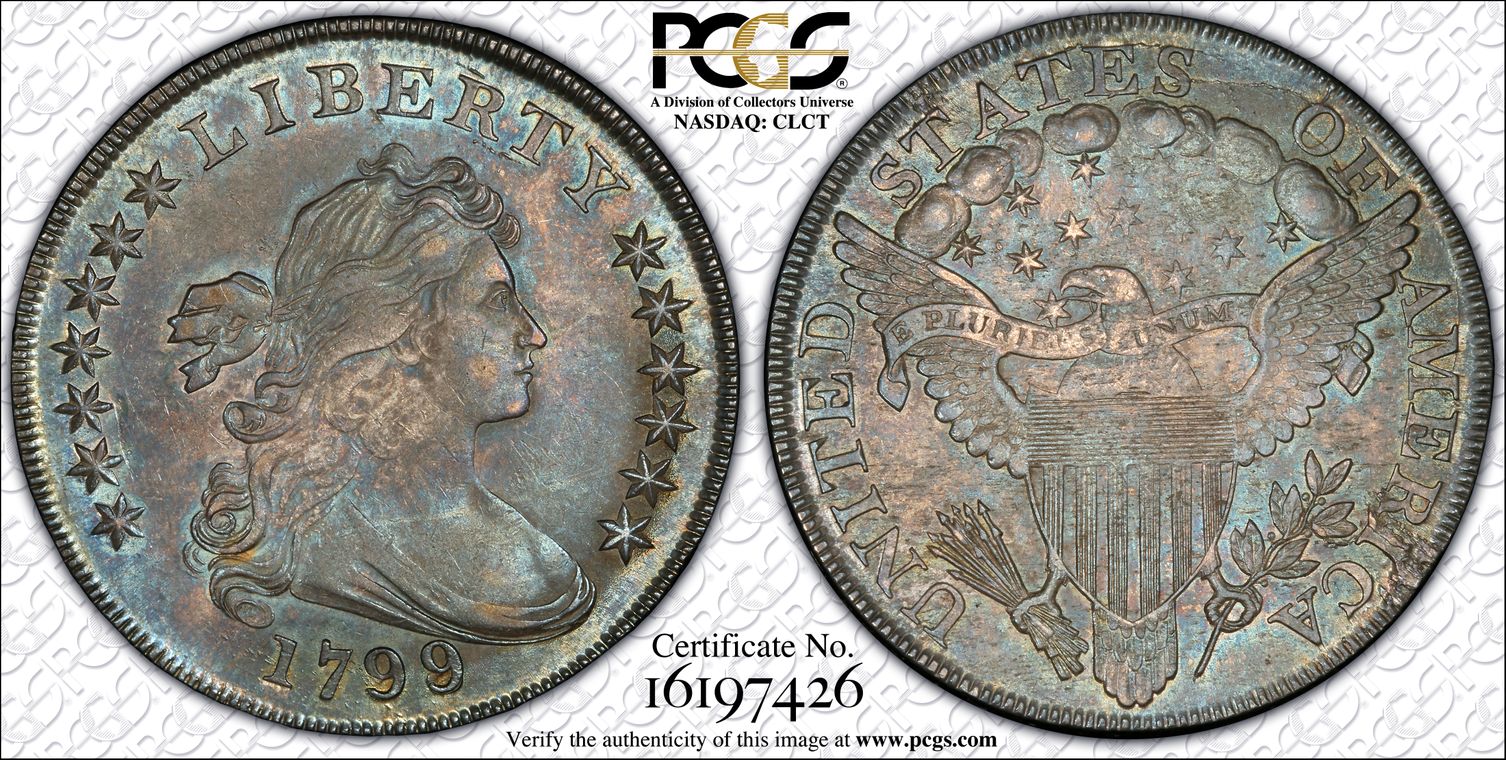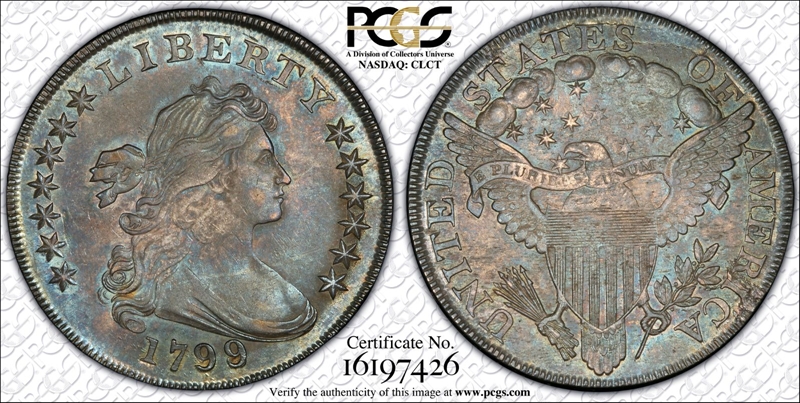1799/8 $1 BB-142 MS62+ 认证号16197426, PCGS号40065
拥有者评论
B-1,BB-142, 13 Starred Reverse 1799/8. This exceptional ex. Col. Green Specimen is listed in Bowers as tied for 3rd finest known but may be higher. Both NGC and PCGS grade it MS62 BUT PC GAVE IT A + AND (CAC) ADDED A STICKER! Weakly struck centrally on obverse and reverse is typical for this Die State III. Beautiful iridescent blue, lustrous toning is noted. R2(R4- Perkins) Est.Pop.150-250 coins. High CC.
专家评论
Q. David Bowers
The following narrative, with minor editing, is from my "Silver Dollars & Trade Dollars of the United States: A Complete Encyclopedia" (Wolfeboro, NH: Bowers and Merena Galleries, Inc., 1993). Note: the Notable Specimens list should be used with caution - it has been updated in my 2013 edition of "The Encyclopedia of United States Silver Dollars 1794-1804."Bolender 1, Haseltine 1
OBVERSE 1: See description under 1799/8 BB-141.
Obverse die used to strike BB-141 (1st use), BB-142 (2nd use), and BB-143 (relapped; 3rd use).
REVERSE B: 13 stars above eagle. Leaf points to center of I in AMERICA. Star touches point of lower part of eagle's beak; ray points to the left outside of the U in PLURIBUS; U is usually weakly struck. Far right edge of A is over junction of clouds 3 and 4. First A in AMERICA touches 3rd feather, and rests on fourth. Die cracked and scaled between R and I in AMERICA, above same I, and above right part of first T in STATES. Slight die crack sometimes. shows through bottom. of ES up to top of 0, another through lower part of OF.
Reverse die used to strike 1799 BB-142 only.
DIE STATES:
Die State I: Intermediate state of obverse used earlier to coin BB-141 and later to coin BB-143. Tiny flaw or crack above R in LIBERTY now extends slightly to left beyond R. Flaw at left base of E about 50% larger than on BB-141,.Several raised flaws below RT are about the same as on BB-141. Numerous small raised areas in field from area between star 7 and t, extending toward close to hair above ribbon. Very tiny flaw between ray of star 7 and the bottom left of L. Reverse die without tracks. May not exist with perfect reverse die.
Die State II: Obverse as above. Reverse die as described by Bolender, with crack between R and I of AMERICA and above I; crack above right part of first T in STATES; slight die crack through bottom of ES of STATES to top of O in Of'; another crack through lower part of OF.
Die State III: Die flaws advanced at I of, AMERICA; die cracked at ATES OF, wing to ribbon, and at AME. Crack from denticles to left side of O, on to junction of clouds 6 and 7. Cracks around much of the border; die shattered. New Netherlands 48th Sale: 626. MS-60, ex Waldo C. Newcomer, Col. E.H.R. Green, James G. Macallister. This is the die state most usually seen.
COLLECTING NOTES: 1799/8 BB-142 is in the middle, rarity-wise, of the three overdate varieties of this year. I estimate that 350 to 600 are known today of this variety.
While most examples are in grades up to and including EF, a number of AU and Mint State coins have' crossed the auction block. Of course, some pieces graded as Uncirculated years ago would fall into the AU category today. Interestingly, 1799/8 BB-142 is the rarest of the three overdate varieties in grades below Fine. Apparently, few ever spent an extended amount of time in circulation.
This, BB-141, and BB-143 are in especially great demand as overdates, by date collectors; the demand from variety collectors is additional. In his 1881 Type-Table, J.W. Haseltine called this variety very scarce.
NOTABLE SPECIMENS:
Carter Specimen. MS-63. Stack's, Amon Carter, Jr. Collection, 1984:224. "Die cracks at T and RI on the reverse. Brilliant Unc, and choice. A prooflike specimen with exquisite golden and pale iridescent toning."
Chalkley Specimen. MS-60+. Superior, 1990:2860. "MS-60+. Sharply struck with each of the obverse stars displaying their five radial lines. Central reverse has minute weakness in shield. Several die chips and flakes are noted, especially on the reverse. The I of AMERICA has a large area of sinking, characteristic of this variety."
Aspen Specimen. MS-60. Bowers and Merena, Dr. Nelson Page Aspen Collection, ANA Convention Sale, 1989:369. "MS-60 to 63. Lustrous surfaces with pleasing blushes of mottled golden brown and gunmetal-blue iridescence. Most of the design details are well struck except at the extreme centers."
Auction'84 Specimen. MS-60. Stack's, 1984:1185. "Brilliant Unc., frosty lustre with rich natural sea green and pink iridescent toning. The reverse showing signs of die crumbling at I of AMERICA."
Clarke Specimen. MS-60. Waldo C. Newcomer Collection. Col. E.H.R. Green Collection - James G. Macallister to T. James Clarke Collection - New Netherlands 48th Sale, 1956: 626. "Die flaws above and to left of I in AMERICA. Lustrous, iridescent Unc. Rather weak at the inevitable obverse high points; the reverse weak at eagle's head and shoulders, motto, stars at upper r. Evenly centered, the boldness about the perimeter. The reverse die flaws are advanced; the die cracked at ATES OF, wing to ribbon, and at AME."
Wolfson Specimen. MS-60. Stack's, Samuel W. Wolfson Collection, 1963:1380. "Brilliant Unc., sharply struck. Full mint bloom, deep serrated borders."
French Family Specimen. MS-60. Stack's, French Family Collection, 1989:10. "Brilliant Unc., frosty lustre with rich natural sea green and pink iridescent toning. The reverse showing signs of die crumbling at I of AMERICA. Very late die state, die rust at upper obverse and scattered across the reverse. Several die breaks at the upper reverse as well."
Ron Guth
The 1799/8 dollar is comprised of three different die varieties. Two (BB-142 and BB-143) have thirteen stars on the reverse; one (BB-141) has fifteen starts on the reverse. Of the three varieties, BB-142 is the most common. The reverse of BB-142 developed some die chipping between the R and I or AMERICA and in the denticles at the upper right of the I of AMERICA.
There are at least six Mint State examples of this variety, with a possible one or two more. The best example (by at least two full points) is the remarkable PCGS MS65 from the Eliasberg Collection, now in the Bruce Morelan Collection of Early Dollars (see the illustration above).
PCGS #
40065
设计师
Robert Scot
边缘
Lettered: HUNDRED CENTS ONE DOLLAR OR UNIT
直径
40.00 毫米
重量
27.00 克
铸币数量
423515
金属成分
90% Silver, 10% Copper
更高评级数量
0
评级较低的钱币数量
26
地区
The United States of America
价格指南
PCGS 数量报告
拍卖 - PCGS 评级的
拍卖 - NGC 评级的
























